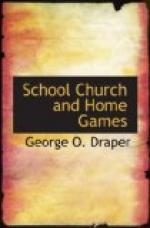The chairs are arranged in a circle in the center of the room, with the seats away from the center. There should be one less chair than there are participants in the game. The participants form a line around the outside of the chairs and march forward around the chairs, while the piano, phonograph, or some other musical instrument is being played. The instant the music stops each player tries to sit in a chair. The one failing to get a chair drops out of the game. A chair is taken from the circle and the group starts marching again with the music. When the music stops they seek chairs as before, the one failing to secure one dropping out. A chair is taken out of the circle after each scramble and so the group diminishes until all are eliminated except one, who is crowned King of Jerusalem. If the group be large more than one chair can be eliminated at a time.
CHAPTER V
TRICK GAMES FOR SOCIABLES
Hindoo Blind Reading
Slips of paper are given to all of the guests and they are instructed to write thereupon a brief sentence of three or four words and to carefully fold the paper. These messages are then collected, and the Hindoo Mystic proceeds to amaze his auditors by rubbing the messages, still folded, one after another across his forehead and telling what is written on the folded paper.
The Trick—The message reader has an accomplice who is instructed to acknowledge that he wrote the first note read by the mystic, no matter what that note may be. The mystic makes up in his mind a brief sentence after rubbing the first slip of paper on his head. This sentence is acknowledged by the accomplice. The mystic, after having the note acknowledged, opens it apparently to corroborate his reading, but in reality he is reading the note written by someone else. Upon rubbing the next slip of paper across his forehead, he announces the contents of the note last read, which naturally is acknowledged with wonderment on the part of the individual who wrote it. He then apparently looks at this slip of paper, but in reality he looks at the paper which he next intends to read.
Mental Telepathy
The group is told that if enough people think hard enough about one object they can communicate the thought to a person who knows nothing about it. One or two “unwise” persons are asked to leave the room and nothing is decided upon. But the group is told that when each “unwise” person comes in in turn, the second thing that is named must be admitted to be the right object. Great disappointment should be shown at his failure to get the right object the first time and he should be heartily congratulated on his success the second time. This continues until he realizes that he is duped.




